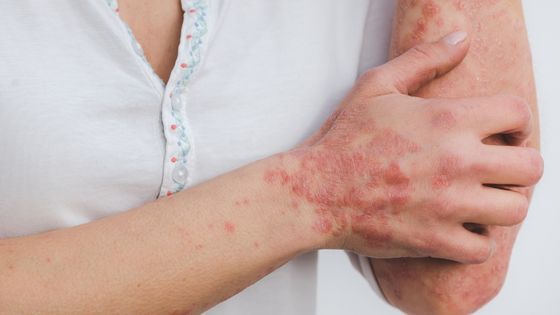Psoriasis is a type of autoimmune chronic skin condition. In this condition, the skin cells keep building up rapidly. Due to this cell building, the skin surface gets scaly. People also get inflammation and redness around the scales on the skin. These psoriasis scales are usually whitish-silver with red patches. Meanwhile, if the person has a darker skin tone then he has the scales may appear purplish with brown-grayish scales. If these psoriasis patches are not treated, a person may also get cracked and bleed.

A person faces psoriasis when the skin production rate increases. The normal skin cell cycle is 1 month but in psoriasis, the skin production occurs within a few days. Due to the overproduction of skin cells, the skin cells get buildup and result in scales. Psoriasis mainly appears on the knees and elbows. But a person can get psoriasis on the feet, hands, scalp, face, and neck region. Some other less common regions where a person can get psoriasis are the mouth, nails, and area near the genitals.
Is psoriasis genetics?
Yes. People can get psoriasis through genes. If a person has this skin condition then other family members are at higher risk of developing psoriasis. However, this skin disorder is not contagious. Psoriasis won’t spread to other people with touching or any type of contact.
Types of Psoriasis
Plaque Psoriasis
This is the most common type of psoriasis. In this condition, the skin gets red, with inflamed patches on light skin tone. Whereas in dark skin, the patches appear gray with dark brown patches. These patches usually appear on the knees, elbows, and scalp.
Pustular Psoriasis
The condition mainly appears in adults. In pustular psoriasis, the skin grows white, with pus-filled blisters. The area of the skin gets red or violet in tone. Pustular psoriasis appears on small areas like hands or feet.
Inverse psoriasis
In inverse psoriasis, the skin becomes red, shiny, and inflamed. The patches appear under breasts, armpits, groin, and skin folds near the genitals.
Guttate psoriasis
This type of psoriasis often appears in childhood. The skin gets a small pink (in light skin tone) or violet (in dark skin tone). The patches usually appear on the arms, torso, and legs.
Erythrodermic psoriasis
This is a severe skin condition and a very rare type of psoriasis. Erythrodermic psoriasis can occur on a large section of the body. The affected skin looks like sunburn and the person may also get a fever due to this condition. Erythrodermic psoriasis can be life-threatening so you should get a psoriasis treatment Connecticut. Proper medication and treatment will reduce the condition and other symptoms.
What causes psoriasis?
The exact cause behind the psoriasis condition is unknown. But some research shows that psoriasis can occur due to genetics and the immune system. If a person has psoriasis then his coming generation may develop the same skin condition. The other family member can also develop psoriasis.
This is a type of autoimmune condition where the body starts attacking itself. The WBC starts attacking the skin cells mistakenly. These WBCs are supposed to destroy infections and create a defense. But these white blood cells start attacking the
Skin cell production due to which the skin cell production rate increases.
Common symptoms of psoriasis
The symptoms of psoriasis differ from person to person. In some people, psoriasis occurs in small parts whereas in some this condition can appear in a large area.
- Raised and inflamed patches of skin
- Psoriasis patches appear red on light skin and blue-purple on dark skin
- Soreness around psoriasis patches
- Painful
- Swollen joints
- Itching
- Burning sensations
- Dry skin with crack and bleed
These are the common symptoms of psoriasis. However, not all people with this condition face all these symbols. In some people, psoriasis appears like a cycle. The symptoms occur for a few days or weeks and then disappear completely.
Common triggers for psoriasis
If a person has psoriasis then his condition may trigger due to certain things.
Alcohol: Alcohol can trigger psoriasis conditions. If a person drinks a lot, psoriasis may appear often. He needs to reduce alcohol intake to prevent psoriasis recurrence.
Stress: Any type of stress can trigger psoriasis. Stress can cause problems to the immune system due to which psoriasis gets triggered.
Injury: Any type of injury, cut, or accident may trigger your skin condition. Sometimes sunburns, vaccines, and injections can trigger psoriasis.
Medicines: Certain medicines like lithium, BP medicines, and antimalarial medication can trigger this condition.
Treatment options for psoriasis
Topical treatment
Some creams and ointments are available to reduce psoriasis. These creams help in reducing redness, and itchiness. Common topical psoriasis treatments are anthralin, corticosteroids, retinoids, salicylic acid, moisturizer, vitamin D analogues, etc.
Medication
If a person has severe psoriasis then topical treatment may not provide any relief. He may require injected or oral medicines. Common medicines for psoriasis are biologics, methotrexate, oral retinoids, and cyclosporine.
Natural medication
Certain natural medications are also available to treat psoriasis. These medicines reduce the itchiness and redness of the skin. If the skin feels inflamed, these medicines provide good relief. Natural medicines prevent recurrence and do not have any type of harmful side effects.
Light Therapy
Light therapy is also available for treating psoriasis. It requires UV or natural light. The light kills overactive WBCs to reduce skin cell growth. Light therapy is used when a person is facing mild to moderate psoriasis. For severe psoriasis, a person may reduce therapy with certain medications.
